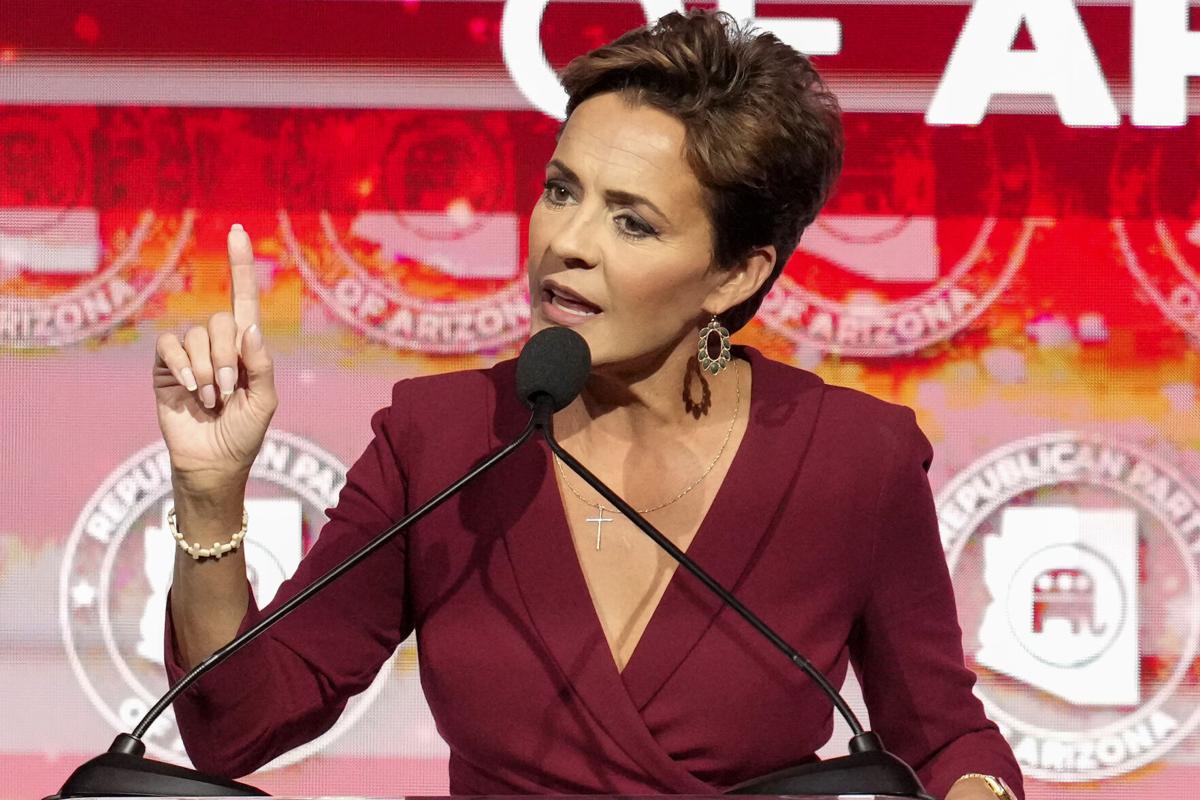PHOENIX — Maricopa County wants a judge to toss out Kari Lake’s bid to immediately be given election records so she can challenge her loss to Katie Hobbs in the governor’s race.
Deputy County Attorney Joseph Branco acknowledged Lake is entitled to the various documents she wants, to the extent they exist. The losing Republican candidate has submitted a laundry list of requests for public records on issues ranging from Election Day printer and tabulator problems to information on voided and “spoiled’’ ballots.
But her request amounts to “jumping to the front of the line,’’ he told Maricopa County Superior Court Judge Scott Blaney at a hearing last week.
Branco said nothing in state law entitles Lake to get ahead of others, ranging from public interest groups to inmates to news reporters, whose requests for public records from the county were submitted long before her Nov. 15 request.
If the judge agrees and dismisses the case, that could affect Lake’s stated plans to file suit to overturn Arizona’s election returns, which showed she lost to Democrat Hobbs by more than 17,000 votes.
Arizona law requires all election challenges to be filed within five days of the formal state canvass, or certification of the vote tallies. That is set to occur Monday, Dec. 5. But Blaney, while agreeing to expedite the records lawsuit as “an issue of statewide concern,’’ isn’t even scheduled to hear arguments until Wednesday about whether he should order the county to give special treatment to Lake — or throw out the case.
Lake’s attorney, Tim La Sota, noted the time crunch. “This information loses not all of its value but a lot of its value in an election context pretty quickly,’’ he told the judge.
‘Prompt’ not defined by public records law
The state’s public records law says public records and other matters in the custody of any public officer are open to inspection. And if copies are requested, they must be furnished “promptly.”
The law also says the records are deemed denied if they are not produced promptly, allowing the person requesting them to sue.
La Sota contends the failure of the county to produce the records within days of Lake’s request — and before Monday’s canvass — violates the law.
Only thing is, there is no definition in the law about what constitutes a “prompt’’ response. So he is arguing to Blaney that it has to be determined based on the circumstances.
“In this case, ‘promptly’ must mean sufficiently in advance of the canvassing to permit plaintiff and the court to quickly determine the full extent of the problems identified and their impacts on electors due to numerous documented failures in the (county’s) administration of the election,’’ La Sota said.
With no response to the records request by Nov. 23, Lake sued. And now she wants the case put on the fast track, even though under normal circumstances the county would not be required to even file its response to the lawsuit until Dec. 19.
Maricopa’s Branco said the claim is flawed, saying it is based on Lake’s “subjective expectations’’ of what constitutes promptness in production of records. Her perception is legally irrelevant, he told the judge.
“Setting this (claim) on an expedited schedule I think would set a terrible precedent,’’ Branco said. He said it would pave the way for a series of lawsuits by a host of individuals and groups, all of whom argue the records they seek are “extremely important to them.’’
“County agencies receive requests from inmates who believe that the records they are going to receive will lead to their liberty,’’ Branco told Blaney. Then there are activists concerned about animal welfare or homelessness who “believe that getting those records is going to move the needle on public policy decisions.’’
There also, he noted, are news reporters “who want records as promptly as possible, as fast as possible, immediately, in order to meet deadlines.’’
“I don’t think there’s an exception for records that have to do with elections,’’ Branco said.
Even a court order wouldn’t satisfy request
Beyond that, he said some of what Lake seeks already was posted by the county on its website designed to answer various questions about how the election was run. That includes question about what happened with some printers that resulted in the ballots not being immediately read at the voting centers. The county will work with La Sota to try to narrow the scope of the request to make it easier and faster to produce other records, Branco said.
Finally, he said even a court order — should Blaney issue one — won’t get Lake what she wants when she wants it.
“If the court was to order some type of relief today ... there is nothing under Arizona law that would provide for the immediate production or immediately produce and make available those records,’’ Branco said. Instead, all Blaney could do is direct the county to produce the records promptly.
La Sota countered that this isn’t a question of interpreting the law based on Lake’s subjective expectation of the importance of her request.
“The Legislature used the word ‘promptly,’ “ he said of the records law. “It means different things in different contexts.’’
In this context, it involves a general election, La Sota noted. “There’s a lot of public interest.’’
He also said other candidates are interested in the same information, citing the 510-vote difference that separates Democrat Kris Mayes from Republican Abe Hamadeh in the race for attorney general.
“I think that, objectively, most people would say, ‘well, these records are more important in terms of producing them more promptly than, say, somebody who’s trying to change policy,’ “’ La Sota said. “We want the county focused, first and foremost, on this public records request.”
Unlike in other countries, elections in the U.S. are highly decentralized, complex and feature a long list of races, from the national level down to town council seats.





